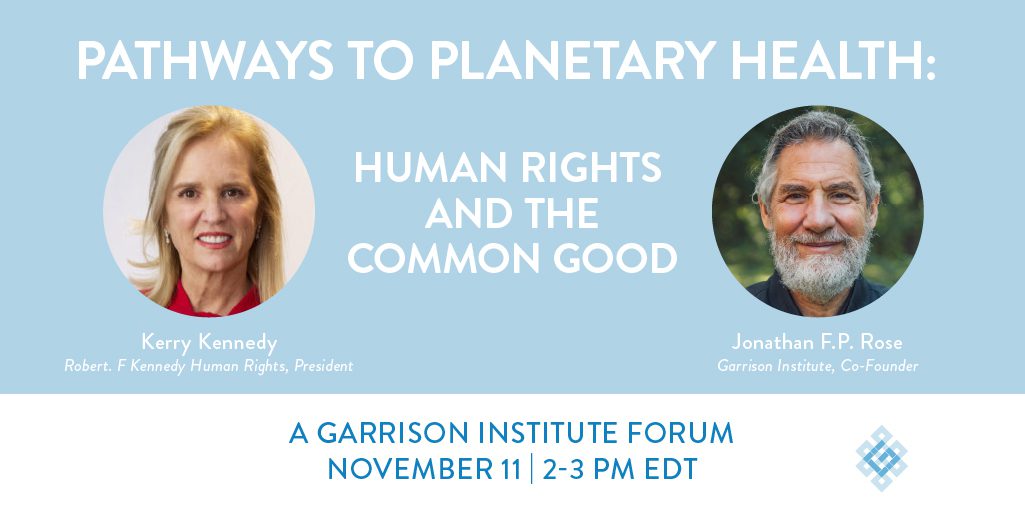Kerry Kennedy: Bringing Mindfulness to Activism
“The difference between being a victim and a hero is action with a loving heart.” —Kerry Kennedy
by Aidan Kennelley
Kerry Kennedy, the president of the RFK Human Rights Foundation, has dedicated her life and work to elevating the voices of the oppressed and subjugated. In her conversation with Jonathan Rose, co-founder of the Garrison Institute, she discussed at length the relationship between her Catholic faith, mindfulness, and human rights activism.
The daughter of Robert F. Kennedy, Kerry was born the seventh of 11 children. She described some of her earliest memories observing her father’s work in John F. Kennedy’s Justice Department — considering her father’s and uncle’s form of progressive politics, she inevitably spent her youth absorbing ideas from some of the most influential and inspirational American activists of the last century.
But it was a series of tragedies that truly pushed her into the world of human rights activism. There were the devastating assassinations of Medgar Evers; JFK; Malcolm X; Martin Luther King, Jr.; and her own father. Kennedy also felt great helplessness and frustration at several injustices in her childhood: her best friend in 5th grade told Kennedy that her father beat her mother; two of her close friends were raped in high school; and a member of an exchange family she’d become close with as a senior in high school became one of the first Americans infected with HIV/AIDS, costing him his very young life.
We can’t solve the climate crisis without addressing major social justice crises like child labor, violence against women, or rising income inequality.
When she was introduced to the Universal Declaration of Human Rights in college, as an intern at Amnesty International, Kennedy finally understood these moments for what they were — human rights violations — and realized there were people who worked to ensure human rights and equality for all. It became her mission then, as well.
Kennedy emphasized that defending human rights is not about “helping the voiceless.” Rather, it is the duty of those with privilege and power to elevate the voices of others and to listen. As she puts it, “those closest to the problem are closest to the solution.” Furthermore, Kennedy described the importance of taking a holistic and intersectional approach to social activism. She insisted that we can’t solve the climate crisis without addressing major social justice crises like child labor, violence against women, or rising income inequality. All of these issues must be addressed together.
The relationship between her Catholic faith and her mindfulness practice has allowed her to be less reactionary and to take the time she needs as an activist to avoid burnout.
Kennedy’s outlook on human rights and social justice has been heavily shaped by her religious and spiritual convictions. She described her Catholic upbringing as one that presented her with an all-loving, all-forgiving God who accepts all for who they are. The foundations of her faith-based background have been strengthened by her discovery of mindfulness meditation practice. She asserted that having 20 minutes to sit twice a day has allowed her to be in a “space of emptiness” and to grow closer to God’s love. Further, a one week silent retreat that she participated in last year at the Garrison Institute opened up new pathways for loving kindness in her line of work. The relationship between her Catholic faith and her mindfulness practice has allowed her to be less reactionary and to take the time she needs as an activist to avoid burnout.
In closing her discussion with Jonathan Rose, Kennedy reminded the audience to have perspective on the rate of social change, and to be heartened by the progress we have seen. She emphasized the fact that 40 years ago when she was starting her career, there were plenty of reasons to be pessimistic: right wing dictators in South America, Apatheid in South Africa,, ambivalence about the environment. Today, things are different.
Certainly, taking a step back and appreciating progress is important for activists of all brands. As Mrs. Kennedy put it: “It’s hard to change things. But it’s a lot harder to stop things from changing.”
* * *
You can find more information about Kerry Kennedy and the work of the RFK Human Rights here.
